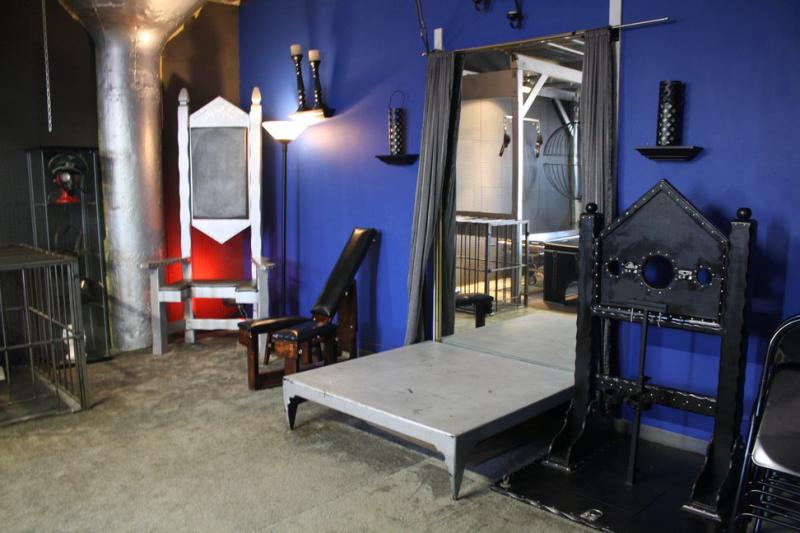Into The BDSM Dungeon: A Community Critical Of 'Fifty Shades Of Grey'

One of the biggest critics of ‘Fifty Shades,’ some might be surprised to learn, is the BDSM community.
“I like how it brought more attention to BDSM,” said professional dominatrix (also known in more casual terms as a "pro-domme") Cybill Troy. “But it’s not like BDSM at all.”
The World Of Kink
“Fifty Shades” stirs much of its controversy for featuring graphic sex scenes and an abusive relationship. In the actual BDSM world, Troy says, professionals stress “safe, sane and consensual” practices and even no penetration with their clients.
Contrary to the series, where the relationship involves a dominant male and a submissive female, Troy says there are more professional dominant females who often take titles such as “Mistress,” “Lady” and “Goddess,” and submissive males, who are often called “slaves.”
Because of the rise in attention to BDSM, many classes and even handbooks are available for those who want to explore what's often referred to as "the world of kink." Justine Cross, who runs Dungeon West in L.A., said that while many people practice in the privacy of their homes, if a person wanted to have a session with a pro-domme, he or she could visit a dungeon. Dungeons fall into two types: private and commercial.
Private dungeons, like Dungeon West, have one pro-domme where sessions are by appointment, and the space itself can be rented out to other pro-dommes, as Cross does.
“People really like my space," Cross said. “Because they know they’re not going to run into anybody else here.”
Some professionals work in commercial dungeons like the Den of Iniquity L.A., which is co-directed by Troy. These dungeons have a staff of pro-dommes who rotate in shifts.
People may also be surprised to discover that pro-dommes don’t always have in-person sessions with clients. They may also take part in “distance training," which involves sessions where commands are conveyed through phone, email and/or webcam. Cross often uses distance training for clients who live in other states and even in other parts of the world.
SEE ALSO: 'Fifty Shades Of Grey:' The Protests And Promotions
But wherever (and however) people practice kink, the core of BDSM is the relationship between a pro-domme and the client, which can last many years. Since clients can easily move on to another pro-domme, Cross believes BDSM relationships are “more about the quality of time that’s being spent.”
Troy personally finds the term “client” to be degrading. "Calling someone a client takes the personal connection out of it,” she said. “We know these people better than their wives, better than anyone in their lives.”
Troy and some people in the community believe BDSM is a sexual orientation. As a result, there are advocates claiming that BDSM practioners as a sexual minority, with the community even having the attention of the courts and the Harvard Law Review.
However, critics like author and blogger Clarisse Thorn contends this isn't the case.
“[BDSM is] not deep-rooted for [some people]. It’s not unavoidable, it’s not necessary, it doesn’t go to their core,” Thorn wrote. “They can change from being into BDSM to not doing BDSM.”
Regardless of whether or not a person can choose to practice kink, "safe, sane and consensual" practices are ever-important in professional sessions.

"Safe, Sane And Consensual"
This is not to say that people on the outside don't doubt the legitimacy of “safe, sane and consensual.” Kink is not without its eyebrow-raising practices, such as humiliation training and sissy training.
People against BDSM also point to a growing rap sheet as injuries and deaths involving bondage, suffocation and sex toys come to light. Slate writer William Saletan argued that it will be hard for BDSM to be accepted as normal practice, likening it to “consensual domestic violence.”
Saletan also pointed out the hypocrisy in accepting kink, writing that “abduction, slavery, humiliation, torture—everything we condemn outside the world of kink is celebrated within it."
But Troy takes particular offense when critics “hint there’s something wrong with the slaves... Or that we have disdain for them in any way.”
Cross stresses the importance of safety by installing a security system in her dungeon and carefully reviewing all her clients. Her facilities and equipment are frequently cleaned and Cross only does sessions when she and her clients are not under the influence and are acting within the “safe, sane, consensual” creed.
“I’ve certainly said no to people who I didn’t think were sane or [if] I feel like it wasn’t safe,” Cross said.
READ MORE: The Price Of Sex At USC
Paying Tribute
One point of contention within BDSM is the professional aspect. Pro-dommes make their living through payments (both monetary and non-monetary) from their clients, which can be called “tribute,” “tithe” or “financial domination,” depending on the dominatrix. These payments give potential clients and critics pause, especially given the fact that pro-dommes can earn substantional amounts. Some even have wishlists of items their clients can buy for them.
Professionals who identify as “real” dominatrixes write off others who, they say, practice BDSM purely for tributes. Dr. Danielle Lindemann explores this tension in the academic journal Sociological Forum: “It is clear that while all the women explored in this study had received a financial compensation to dominate men,” she wrote, “Lifestylers repeatedly described themselves as individuals who possessed symbolic capital disconnected from profit.”
In other words, some professionals see the gifts and monetary tributes as clients’ symbols of showing gratitude and servitude.
Beyond Kink
But for those who want to go into professional BDSM, whether as a dominatrix or a submissive, Troy said that the most important thing is for the person to have “a genuine love for it.”
Without it, pro-dommes in particular will “end up burnt out and resentful," she said.
In general, the men who go to a dominatrix arguably do so willingly, and many of them enjoy being around their dominatrixes. Jack is one of Cross’ slaves who has been with her for three years, and does tasks for her such as cleaning and driving.
He said he found a “missing” piece of his life when he decided to go to Cross. “Justine is the best thing to ever happen to me... I’ll keep serving her for as long as she’ll have me.”
Reach Staff Reporter Heidi Carreon here. Follow her on Twitter here.



